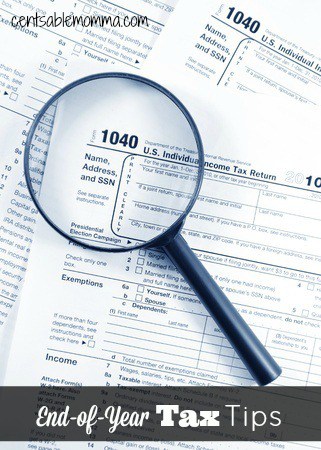As the saying goes, "Nothing is certain but death and taxes". As the year comes to an end, we all have to prepare to file our taxes.
Here are some things that you can do to make tax season a little bit easier.
- If you itemize, make sure that you make any charitable contributions (both cash and non-cash) by 12/31 to count for the 2015 tax year. I wouldn't recommend waiting until 12/31 to donate to the Salvation Army, because the drop-off line gets really long (wonder how I know that, huh?).
- You also need to make any contributions to your 529 plan before the end of the year (you have until 4/15 to contribute to your IRA). If you don't contribute to your own state's 529 plan, it's probably not deductible on your state taxes, so it doesn't matter when you contribute.
- If you itemize, pay all tax deductible bills before the end of the year. I also usually schedule my January mortgage payment for a day or two before the end of the year to make sure that it is processed as a December payment. Also, since my birthday is in January, I usually get my car registration (personal property taxes) at the end of December. I pay it before the end of the year to claim it on the this year's tax bill. If your property taxes are due early in the year, you may want to pay them before the end of this year, if possible.
- Make sure that you use up all your 2015 Flexible Spending Account (FSA) money before the end of the year (and claim it by the deadline for your plan). An FSA, is a "use it or lose it" plan, so if you have money left over at the end of the year, you lose it. If you don't have an FSA, you might want to look into it for next year. It's basically a plan where you can contribute money pre-tax to an account where you use the money to pay for medical expenses. Since you'll lose it, if you don't use it, I'm usually conservative in how much I contribute, but I always add known expenses like well-child visit copays, glasses for the family, etc. You may be able to carry over $500 in your FSA, but you'll need to check with your employer.
- If you are going to have a large capital gain, then you might want to sell some loser stocks to offset the gains. But, be sure that you actually sold the stocks for a capital gain rather than just a gain on paper (you haven't really lost or gained money on your stocks until you sell).
- If you plan to gift money to someone, you can make an annual gift of up to $14,000 per person (for 2014) that's tax exempt to both the giver and the recipient. You can double that amount if both you and your spouse make a contribution.
- Gather all your receipts. If you did any online surveys or had any blog income, you need to claim that money as income, even if you don't get a 1099 form from the company. You can, however, claim any expenses that you paid to earn that money, though, like a percentage of your internet bill, advertising, etc.
- Keep track of your final tax result (balance due or refund). For the past 5 years or so, I've kept an Excel spreadsheet where I track what my tax refund (or amount owed) is expected to be at any time. Although my husband's salary and tax contributions are steady, I was working from home, and I made different amounts each month with no tax deductions. So, I wanted to make sure that we weren't going to owe a lot of money at the end of the year.
- Adjust your Withholding. If you expect to have a large tax refund or owe a lot of money to the IRS, then you'll want to check whether your witholdings are correct for your situation. You can visit the IRS website to see if you need to adjust your W-4 with your employer.








Leave a Reply